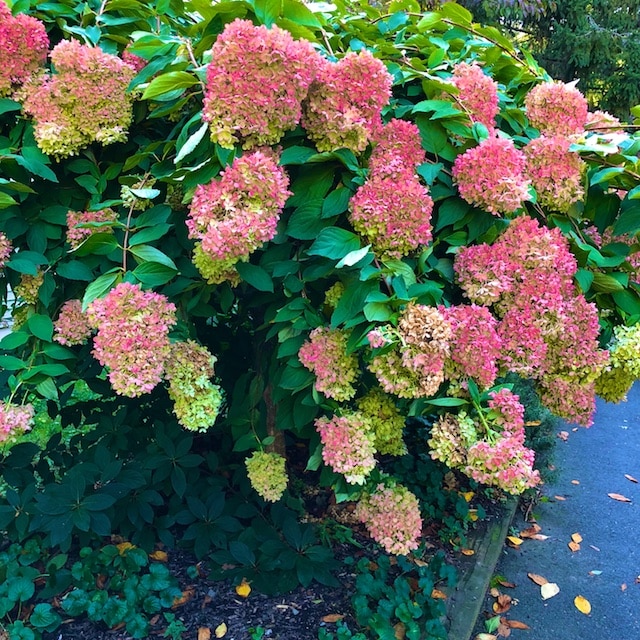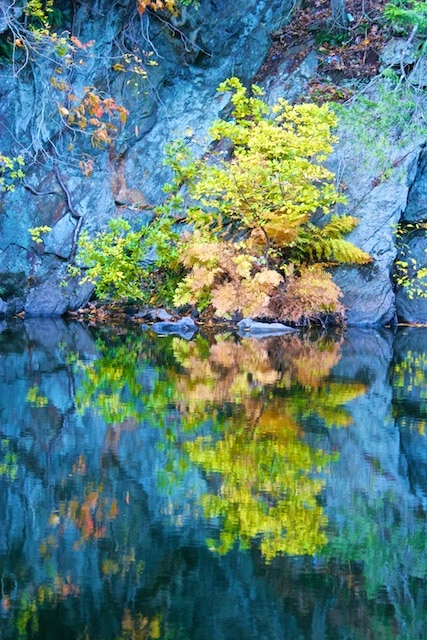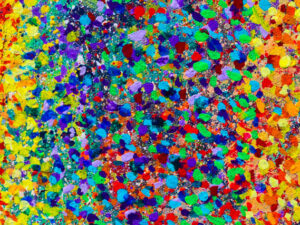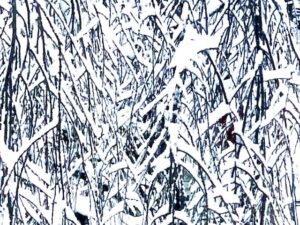
–
The Fall of the Leaf
Grown tired of this rank summer’s wealth,
Its raw and superficial show,
I fain would hie away by stealth
Where no roads meet, but still ‘t doth trivial grow.
A sober mind will walk alone,
Apart from nature if need be,
And only its own seasons own,
For nature having its humanity.
Sometimes a late autumnal thought
Has crossed my mind in green July,
And to its early freshness brought
Late ripend fruits and an autumnal sky.
A dry but golden thought which gleamed
Athwart the greenness of my mind,
And prematurely wise it seemed,
Too ripe mid summer’s youthful bowers to find.
So have I seen one yellow leaf
Amid the glossy leaves of June,
Which pensive hung, though not with grief,
Like some fair flower, it had changed so soon.
I scent my med’cine from afar,
Where the rude simpler of the year
October leads the rustling war,
And strews his honors on the summer’s bier.
The evening of the year draws on,
The fields a later aspect wear,
Since summer’s garishness is gone
Some grains of night tincture the noontide air.
Behold the shadows of the trees
Now circle wider ’bout their stem,
Like sentries which by slow degrees
Perform their rounds, gently protecting them.
And as the season doth decline
The sun affords a scantier light,
Behind each needle of the pine
There lurks a small auxiliar of the night.
After each shrub and straggling fence
That marks the meadow’s pensive green,
And shows the meadow’s opulence,
Evening’s insidious foot at noon is seen.
Wave upon wave a mellower air
Flows over all the region,
As if there were some tincture there
Of ripeness caught from the long summer’s sun.
I hear the cricket’s slumbrous lay
Around, beneath me, and on high,
It rocks the night, it lulls the day,
And everywhere ’tis nature’s lullaby.
But most he chirps beneath the sod,
Where he hath made his winter’s bed,
His creak grown fainter, but more broad,
A film of autumn o’er the summer spread.
Upon my bed at early dawn
I hear the cocks proclaim the day,
Though the moon shines serenely on
As if her queenly course they could not stay;
Nor pull her down with their faint din
From riding at that lofty height,
Who in her shining knows no sin,
But is unconscious of a nobler light.
The stars withhold their shining not
Or singly or in scattered crowds,
But seem like Parthian arrows shot
By yielding night ‘mid the advancing clouds.
And has time got so forward then?
From what perennial fount of joy
Do ye inspire the hearts of men,
And teach them how the daylight to employ?
From your abundance pray impart,
Who dost so freely spill,
Some bravery unto my heart,
Or let me taste of thy perennial rill.
Small birds in fleets migrating by
Now beat across some meadow’s bay,
And as they tack and veer on high,
With faint and hurried click beguile the way.
The moon is ripe fruit in the sky
Which overhangs her harvest now,
The sun doth break his stem well nigh
From summer’s height he has declined so low.
The greedy earth doth pluck his fruit,
And cast it in night’s lap,
The stars more brightly glisten, mute
Though their tears be, to see their lords mishap.
The harvest rattles in the wind,
Ripe apples overhang the hay,
The cereal flavor of my mind
Natheless, tells me I am as ripe as they.
I hearing get who had but ears,
And sight who had but eyes before,
I moments live who lived but years,
And truth discern who knew but learning’s lore.
Far in the woods these golden days
Some leaf obeys its maker’s call,
And through their hollow aisles it plays
With delicate touch the prelude of the fall.
Gently withdrawing from its stem
It lightly lays itself along,
Where the same hand hath pillowed them
Resigned to sleep upon the old year’s throng.
The loneliest birch is brown and sere,
The farthest pool is strewn with leaves,
Which float upon their watery bier,
Where is no eye that sees, no heart that grieves.
I marked when first the wind grew rude
Each leaf curled like a living thing,
As if with the ripe air it would
Secure some faint memorial of the spring.
Then for its sake it turned a boat
And dared new elements to brave,
A painted palace which did float
A summer’s hoarded wealth to save.
Oh could I catch these sounds remote,
Could I preserve to human ear,
The strains which on the breezes float,
And sing the requiem of the dying year.
I stood beside an oaken copse
When the first gale of autumn sighed,
It gently waved the birch tree tops
Then rustled the oak leaves and died
But not the strains which it awoke,
For in my inmost sense I hear
The melody of which it spoke
Still faintly rising on my inward ear.
A ripple on the river fell,
A shadow o’er the landscape passed,
And still the whispering ferns could tell
Whither the stranger travelled so fast.
How stand the cottages of men
In these so fair October days,
Along the wood along the fen
I see them looming through the mellow haze.
Immersed in Nature there they lie
Against some cliff or chestnuts shade
Scarce obvious to the travellers eye
Who thoughtful traverses the forest glade.
The harvest lies about the door
The chestnut drops its burs around
As if they were the stock that bore
The yellow crops that strew the ground.
The lily loves the river’s tide
The meadow’s are the daisy’s haunt
The aspens on the mountain side
Here child of nature grows the human plant.
The jay screams through the chestnut wood
The crisped and yellow leaves around
Are hue and texture of my mood,
And these rough burs my heirlooms on the ground.
The thread bare trees so poor and thin
They are no wealthier than I,
But with as brave a core within
They rear their boughs to the October sky.
Poor knights they are which bravely wait
The charge of winter’s cavalry,
Keeping a simple Roman state
Discumbered of their Persian luxury.
Thank God who seasons thus the year
And sometimes kindly slants his rays,
For in his winter he’s most near
And plainest seen upon the shortest days.
Who gently tempers now his heats
And then his harsher cold, lest we
Should surfeit on the summer’s sweets,
Or pine upon the winter’s crudity.
Henry David Thoreau
–

5 Comments
-
I too favor autumn,spiritually and aesthetically, but find his iambic pentameter a bit rough.
-
Author
and long!
-
-
Very Nice! Enjoyed the read. Thank you!
Success with your exhibition.
Hugs,
Barbara -
The photo at the end of the poem is…. AMAZING!
-
Author
Thank you!
-






